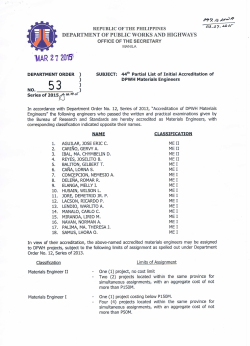
presentation
Hans-Ulrich Heiss Past President EQANIE heiss@eqanie.eu 5/19/2015 1 5/19/2015 Background EQANIE as an Organisation Short History Members of EQANIE Structure of EQANIE The Euro-Inf Label Achievements so far 2 5/19/2015 Background EQANIE as an Organisation Short History Members of EQANIE Structure of EQANIE The Euro-Inf Label Benefits and Achievements 3 With the introduction of the 2-cycle-structure of higher education programs („Bologna process“) in 1999 the European countries also started the built-up of quality assurance systems. This was mainly a top down process driven by the governments. Each country launched some national QA institution and set up regulations for either program or institutional accreditation or both. European umbrella organizations were created (ENQA, EQAR) to ensure some harmonization (e.g. ESG) The academic disciplines and their organizations had little influence. 4 Over the years, university professors (at least in the STEM fields) became more and more concerned about an increasingly formal attitude of the accreditation practice. Their concern was that field-specific aspects (knowledge, skills) were not properly addressed. So they started the development of field-specific quality labels to ensure field-specific minimum standards across Europe. 5 Disciplinary QA-Networks (STEM) in Europe European Quality Labels EQASFood Euro-Inf Bachelor/Master EQANIE IFA Internation al Food Association IFA has worked on development of pan-European LO/QA structures in the field of food science European Quality Assurance Network for Informatics Education CEPIS, Informatics Europe, BCS and many other European Informatics societies Eurobachelor/ Euromaster ECTNA European Chemistry Thematic Network Association More than 150 HEIs + chemical societies in Europe have developed LO for the European BA/MA in Chemistry EUR-ACE Bachelor/Master ENAEE European Network Accreditation Engineering Education All European Engineering Accreditation Agencies + FEANI, SEFI etc. : LO for FCD and SCD Job Profile Degree Degree Degree Company has an opening for an academically trained IT specialist. Applications come from all over the world. Do their qualifications match the job profile? 7 Master‘s Programme Degree Degree University offers Master‘s program. Applicants come from all over the world. Do they meet the entrance requirements? Degree 8 Globalization, Mobility Recognition Trust Quality Assurance Accreditation (Q-Label) 9 Diversity of Diversity of Diversity of Diversity of Acceptance QA approaches institution types programs educational processes 10 5/19/2015 Background EQANIE as an Organisation Short History Members of EQANIE Structure of EQANIE The Euro-Inf Label Achievements so far 11 2008 2009 2010 2011 2012 2013 5/19/2015 2014 12 Purpose of EQANIE • • The enhancement of evaluation and quality assurance of informatics study programmes and education in Europe. (Not-for-profit) 5/19/2015 13 Activities Development of criteria and procedures for QA in informatics higher education. Provision of information. Maintenance of contacts and relations to other European or nonEuropean organisations important for the goals of the Association. Promotion of the development of regional, national and international accreditation bodies. Organisation of events, seminars, workshops and conferences in the field of its activities. Development and maintenance of a system for the award of a European quality-seal for informatics degree programmes 5/19/2015 14 Members BCS AKKORK • ASIIN ANECA 12 members, thereof FBTI FTI CODDI GI ARACIS GRIN CEPIS INFORMATICS EUROPE • 10 national associations/institutions /prof. societies from 7 different countries and 2 European umbrella organisations In total represented in more than 30 different countries Executive Board 7 members Board of Appeals Accreditation Committee (at least 7 members) Secretariat Supports all committees Audit Team (at least 3 members) General Assembly Expert Pool supports elects, nominates, appoints proposes 5/19/2015 16 Two Business Models direct accreditation awarding label HEI degree programmes Accreditation Agency indirect accreditation 5/19/2015 17 5/19/2015 Background EQANIE as an Organisation Short History Members of EQANIE Structure of EQANIE The Euro-Inf Label Achievements so far 18 Field-specific: Generic: Outcome statements 5 areas of assessment allow for: •specific profile •individual approach •new ideas •Needs, objectives •Educational process •Resources •Assessment •Management Euro-Inf Qualification framework (field-specific) Level indicator (6 and 7 of EQF) Field-specific Competency Underlying Conceptual Basis Analysis, Design and Implementation Technological, Methodological and Transferable Skills Personal Competency Other Professional Competencies Developed independently of EQF Influenced by EUR-ACE Developed for accreditation practice 20 5/19/2015 22 5/19/2015 23 performs program accreditation uses a threshold approach (defined standard) is outcome oriented is based rather on the judgement of experienced auditors than on checklists takes into account the variety of educational approaches uses own international pool of experts from academia and business 24 Successful application for the Euro-Inf Quality Label requires e.g.: A clear and coherent concept Well defined and convincing learning outcomes A well functioning quality assurance system (Team-)work of all staff, e.g. each lecturer knows how „his/her“ module contributes to the overall objectives Highly qualified academic teaching personnel Sufficient resources An educational offer that reflects academic standards and the demands of the labour market 5/19/2015 25 5/19/2015 Background EQANIE as an Organisation Short History Members of EQANIE Structure of EQANIE Accreditation with EQANIE Achievements so far 26 ASIIN (Germany) since May 2011 BCS (UK) since Oct 2013 ANECA (Spain) since Oct 2014 27 200 160 140 countries More than 170 labels in 11 180 120 BCS 100 EQANIE 80 ASIIN 60 40 20 0 2011 2012 2013 2014 28 • EQANIE direct accreditations in Italy, Latvia, Spain • EQANIE indirect accreditations (by ASIIN) in Germany, Australia, North Cyprus, Kazakhstan, Finland, Croatia, Armenia • EQANIE indirect accreditations (by BCS) in the United Kingdom • Euro-Inf Labels (as of Decembber 2014) ASIIN: 125 BCS: 39 EQANIE: 12 Thank you for your attention Hans-Ulrich Heiss • Past President of EQANIE • Member of the board of directors, ASIIN • President of the German Council of University Faculties in Engineering and Informatics • Vice President of Informatics Europe heiss@eqanie.eu www.eqanie.eu 30 EQANIE Executive Board (2015-2017) B. Hanny (ASIIN) H.-U. Heiss (Past President) R. Ibbett (BCS, Vice President) S. Martini (GRIN) L. Pacholski (Informatics Europe) E. Vendrell (CODDI, President) O. Zukunft (FBTI) 5/19/2015 31 Euro-Inf Framework Standards and Accreditation Criteria Approved Euro-Inf Output Adoption by EQANIE, all rights reserved Euro-Inf Project 2006-2008 Founding 5/19/2015 32 Level 1 Level 2 Knowledge Skills Competence In the context of EQF, knowledge is described as theoretical and/or factual. • basic general knowledge In the context of EQF, skills are described as cognitive and practical. • basic skills required to carry out simple tasks In the context of EQF, competence is described in terms of responsibility and autonomy. • work or study under direct supervision in a structured context The learning outcomes relevant to Level 1 are The learning • basic factual knowledge of a field of work • basic cognitive and practical skills required • work or study under supervision with some outcomes relevant to or study to use relevant information in order to carry autonomy Level 2 are out tasks and to solve routine problems using simple rules and tools Level 3 The learning • knowledge of facts, principles, processes • a range of cognitive and practical skills outcomes relevant to and general concepts, in a field of work or required to accomplish tasks and solve Level 3 are study problems by selecting and applying basic methods, tools, materials and information • take responsibility for completion of tasks in work or study • adapt own behaviour to circumstances in solving problems Level 4 The learning • factual and theoretical knowledge in outcomes relevant to broad contexts within a field of work or Level 4 are study Level 5 The learning • comprehensive, specialised, factual and • a comprehensive range of cognitive and outcomes relevant to theoretical knowledge within a field of work practical skills required to develop creative Level 5 are or study and an awareness of the solutions to abstract problems boundaries of that knowledge • exercise self-management within the guidelines of work or study contexts that are usually predictable, but are subject to change • supervise the routine work of others, taking some responsibility for the evaluation and improvement of work or study activities • exercise management and supervision in contexts of work or study activities where there is unpredictable change • review and develop performance of self and others Level 6 The learning • advanced knowledge of a field of work or • advanced skills, demonstrating mastery outcomes relevant to study, involving a critical understanding of and innovation, required to solve complex Level 6 are theories and principles and unpredictable problems in a specialised field of work or study • manage complex technical or professional activities or projects, taking responsibility for decision-making in unpredictable work or study contexts • take responsibility for managing professional development of individuals and groups Level 7 The learning • highly specialised knowledge, some of outcomes relevant to which is at the forefront of knowledge in a Level 7 are field of work or study, as the basis for original thinking and/or research • critical awareness of knowledge issues in a field and at the interface between different fields The learning • knowledge at the most advanced frontier outcomes relevant to of a field of work or study Level 8 are and at the interface between fields • specialised problem-solving skills required in research and/or innovation in order to develop new knowledge and procedures and to integrate knowledge from different fields • manage and transform work or study contexts that are complex, unpredictable and require new strategic approaches • take responsibility for contributing to professional knowledge and practice and/or for reviewing the strategic performance of teams • the most advanced and specialised skills and techniques, including synthesis and evaluation, required to solve critical problems in research and/or innovation and to extend and redefine existing knowledge or professional practice • demonstrate substantial authority, innovation, autonomy, scholarly and professional integrity and sustained commitment to the development of new ideas or processes at the forefront of work or study contexts including research 33 Bachelor Master Level 8 • a range of cognitive and practical skills required to generate solutions to specific problems in a field of work or study PhD
© Copyright 2025





![National University Virtual High School [2014-2015]](http://cdn1.abcdocz.com/store/data/000348438_1-3a80ae3134ab49395c6a7578fe5bdf0b-250x500.png)



